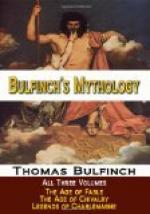He spoke in such moving accents that Rogero could not choose but yield. It was some time before he could command utterance; at last he said, “My lord, when you shall know me for what I am, I doubt not you, like myself, will be content that I should die. Know, then, I am that Rogero whom you have so much cause to hate, and who so hated you that, intent on putting you to death, he went to seek you at your father’s court. This I did because I could not submit to see my promised bride borne off by you. But, as man proposes and God disposes, your great courtesy, well tried in time of sore need, so moved my fixed resolve, that I not only laid aside the hate I bore, but purposed to be your friend forever. You then asked of me to win for you the lady Bradamante, which was all one as to demand of me my heart and soul. You know whether I served you faithfully or not. Yours is the lady; possess her in peace; but ask me not to live to see it. Be content rather that I die; for vows have passed between myself and her which forbid that while I live she can lawfully wive with another.”
So filled was gentle Leo with astonishment at these words that for a while he stood silent, with lips unmoved and steadfast gaze, like a statue. And the discovery that the stranger was Rogero not only abated not the good will he bore him, but increased it, so that his distress for what Rogero suffered seemed equal to his own. For this, and because he would appear deservedly an Emperor’s son, and, though in other things outdone, would not be surpassed in courtesy, he says: “Rogero, had I known that day when your matchless valor routed my troops that you were Rogero, your virtue would have made me your own, as then it made me while I knew not my foe, and I should have no less gladly rescued you from Theodora’s dungeon. And if I would willingly have done so then, how much more gladly will I now restore the gift of which you would rob yourself to confer it upon me. The damsel is more due to you than to me, and though I know her worth, I would forego not only her, but life itself, rather than distress a knight like you.”
This and much more he said to the same intent; till at last Rogero replied, “I yield, and am content to live, and thus a second time owe my life to you.”
But several days elapsed before Rogero was so far restored as to return to the royal residence, where an embassy had arrived from the Bulgarian princes to seek the knight of the unicorn, and tender to him the crown of that country, in place of their king, fallen in battle.
Thus were things situated when Prince Leo, leading by the hand Rogero, clad in the battered armor in which he had sustained the conflict with Bradamante, presented himself before the king. “Behold,” he said “the champion who maintained from dawn to setting sun the arduous contest; he comes to claim the guerdon of the fight.” King Charlemagne, with all his peerage, stood amazed; for all believed




